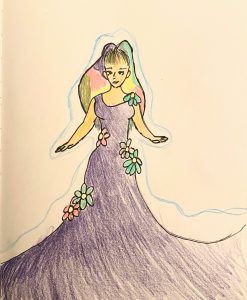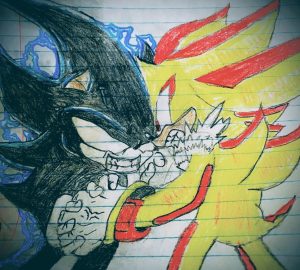
There they are again, far below Elaine’s 20th-story window sitting on a bench outside the adjacent building—a newer senior residence, not as tall as hers. She’s noticed them for several nights now as she rises from bed to go to the bathroom. They linger, ensconced in the white glow of an outside lamp. Beyond them a tiny patch of mangrove hugs the shoreline of the bay. This dwindling strip of wetland trees is currently shrouded in darkness, but Elaine knows it well from her more mobile days when she wandered there often, hoping for a glimpse of sea turtles or dolphins, or possibly even a manatee floating among the tangle of stilt-like prop roots. A small piece of wild that miraculously persists in the midst of rapidly multiplying high-rises.
Who are these night dwellers on the bench? Residents? Employees? Sweethearts? Friends? What are they saying? Elaine glimpses them again just before sunrise when she makes yet another bathroom visit. She maneuvers her walker to the window for a better look, silently cursing her decline from women’s tennis champion back in college to this. She can’t make out their gender, age, or other identifying characteristics. No facial features or hair or flesh, only the general shapes, maybe an arm or leg. They curl toward one another like vines to sunlight, spellbound in rapt and soulful conversation.
Every night it’s the same scene: huddled figures on the bench, always illuminated within the encircling blackness beside the night-covered mangrove, like actors spotlighted on stage. Elaine watches over and over again from her audience perch high above, as bewitched by them as they are with each other. How is there enough in the world to talk about hour upon hour? She’s never had enough interest in anyone to sustain a dialogue that long. And yet here’s proof it can happen. Perhaps her mother was right: she should have developed social skills expected of her instead of concentrating so single-mindedly on her education and career teaching science at a private Long Island girl’s school.
Elaine plays with possibilities and finally concludes the figures below must be lovers, ancient and creaking like herself, meeting in the wee hours for a rendezvous, grabbing at one last chance for connection. It’s a radical interpretation that energizes her. She’s been hoping to die.
Nothing but misery now, aching knees and old crab-like fingers barely supple enough to grasp a fork or cup. Not a shred of love left. Marvin and Ben—two husbands gone. Not that either would have communed with her till dawn. Disappointments, both, in too many ways to inventory, certainly incapable of such cozy intimacy. She never was able to change either one. Nor Daniel, her only child, shared with Marvin. All that’s left between them now: a brief once-a-week Sunday phone call filled with just enough terse sentences to call it conversation.
Not much different from the residents of her building, most of whom nod if they must rather than greet her outright. Certainly, she hasn’t offered many greetings herself in the ten years she’s lived here, but that’s not her fault. Most of them are dull and spent, focused more on their pains and petty gripes and what’s for dinner than discussing anything remotely intellectual—the future of globalization, ocean warming, the promise of artificial intelligence, even something innocuous like new book recommendations or the latest sculpture exhibition downtown. It’s a source of profound frustration for Elaine that she shares so little in common with her fellow residents, or anyone if truth be told. It’s been that way for most of her ninety-two years. If only there was someone now to talk to. About anything at all. Even for a bit.
####
At nightfall, Elaine applies plum-colored lipstick and combs her thin, white hair for the first time in days, then inches out of her apartment with the help of her walker toward the elevator. She’s forced to stop every few steps to catch her breath and regroup. Her knees are on fire. She trembles from the effort to stand as she rides down to the lobby, and exits the elevator into utter silence, as if the world has ceased living. The grand overhead chandelier barely casts enough light to make out the marble floors or tastefully placed planters filled with philodendron and bromeliads. She shuffles past the mousy night woman manning the front desk. Elaine doesn’t remember her name, and the woman barely glances up before gazing back down at her phone. Not even a nod of acknowledgement. The place looks like a luxury hotel—they could certainly act the part, too.
“Rude,” Elaine mutters, but then her anxiety inundates her thoughts. What if her fresh adult diaper doesn’t last the trip? Or she can’t muster the energy to get back? Why has she been consigned to such loneliness in this world that continually falls short?
Oh, never mind, she chides herself as she hobbles out the front entrance toward the building next door, impatient with the gloom that continually permeates her mind. She’s determined to see these lovers up close and join them. Surely, they’ll invite her to sit.
The air carries a hint of cool but it’s not unpleasant on Elaine’s skin. She can feel the sea breeze gently sweeping in from the Gulf across the boulevard from her building. It’s been years since she’s gone out after sundown. How lush the sweet fragrance of night-blooming jasmine, and so quiet without the constant hum of daytime traffic. No moon or stars, but the sky is luminescent as if lit from behind by some soft flame. Against it, Elaine can make out the silhouettes of towering coconut palms, the branching trunks of gumbo limbo trees planted in a row along the walkway, and even the giant crown of the majestic banyan tree that stands near the parking garage with its magnificent twisting braids of aerial roots. How exotic and alien compared to the red oaks, cedars, and sugar maples on Long Island, where she lived her entire life before moving here.
Elaine rounds the back of the building, stopping again and again along the dimly lit walkway to muster more strength. It seems it’s already taken hours to get this far, and every muscle and joint throbs from the grueling effort. But, oh, how she’s missed this beauty, the sweet touch of nature, the only part of life that has ever neared perfection in her estimation with its orderly almighty interconnectedness. So, unlike the human world, which has resulted in nothing but a cascade of disappointments.
Elaine gasps at the sight of two luminous figures ahead on the bench. They look different than they do from her tower window. They don’t move. Their low voices don’t fill the darkness as she imagined they would. She can’t make out their features any better than on high. She inches nearer and nearer—until they’re completely indistinct. In fact, they disappear.
Elaine lowers herself slowly to the bench—their bench—nestled in their soft light. Perfectly alone. “My god,” she murmurs, running her hand across the cool seat. No one has been here tonight. Were they ever?
####
Elaine sits for some time by the hidden mangrove, weighed down by hurt so deep it seems impossible to soothe. It pounds down her entire length from crown to slack belly to old misshapen toes. “Why?” she groans.
She gathers strength to rise, falls back to the bench and strains up again, over and over. If only this were her time to go, be done with this. It’s all too much, these disappointments. Please, she pleads silently, but, of course, the end never comes. Why is she made to keep living?
Elaine finally manages to steady herself upright, clutching her walker and steeling herself for the exertion and patience she’ll need to get back home. As she’s always done in life—maneuvering through moments that displease her by sheer force of will. Too many ordeals to count.
And then she hears it. Something she can’t identify in the mangrove. Not an actual sound exactly; it’s more like a low-level rumbling that isn’t truly audible. She feels it in her gut calling her, something like the sudden sensation of being watched when no one’s in sight.
“Nonsense,” Elaine mumbles and turns for her long shuffle home. Likely just her increasingly odd and unpredictable imagination, which has somehow convinced her that lovers sat here only moments before. Or a hallucination brought on by exhaustion—it’s well past her bedtime after all. Or faulty hearing that’s misconstrued the very real rustling of a marsh rabbit seeking nocturnal shelter, or an osprey arranging its feathers for sleep, or a drowsing alligator. Or perhaps even a … what?
Next, you’ll be imagining mermaids. Elaine bristles at this ridiculous thought as the rumbling calls again. She sinks back to the bench, alarm prickling her skin. A name floats in. Bonbibi. From a teacher’s training workshop on coastal ecology she once attended. Goddess of the vast mangrove forests of eastern India, revered by villagers for her protection against man-eating tigers. But Bonbibi’s defense comes with a catch, one that still strikes Elaine as quite sensible: No one is to take more than they need from the mangrove. Greed mustn’t upset the splendid balance of nature, which provides for all needs, something Bonbibi is sworn to uphold.
You’ve been greedy. The weight of these words is like a slam to Elaine’s head.
“It’s not true,” she cries. Why must she imagine goddesses when she’s in the dark, by herself, far from bed, at her age? She feels leaden, all of her—her thoughts, her bones, life that refuses to depart her burdensome body—so weighty a thousand muscled men couldn’t keep her from sinking into the bowels of the world. How will she ever rise from this bench?
“One of your heart chambers is empty,” Marvin had once shouted, the only time he ever raised his voice. “No amount of giving ever fills it.”
“No!” she hisses, pounding her fist on the bench. What did Marvin know anyway? He, who never dressed quite right, mostly cheap polyesters and poor-quality cottons, made worse by his lazy posture. His lack of geographical knowledge and disinterest in international affairs. His disregard for art and theater. His preference for ballgames—baseball, basketball, football, golf—he loved them all and nothing else nearly as much. An ill-informed man in most regards. Oh, she loved him despite all that. She could never explain it. Yet she never lost an opportunity to remind him of his deficits, left him magazine articles about politics and dragged him to art galleries, told him to sit up straighter and use his brains, all in hopes that he’d finally better himself. I push you because I love you. She used to say this to him. Surely, he knew she cared. It felt like love to her—nurturing him to cultivate his best self.
You’ve been greedy.
Heaviness tugs harder at Elaine. She had said the same thing to Ben, whom she loved slightly less but still did love. Also, a disappointment—unable to read the veiled motives and desires of others, making it impossible to discuss friends and family because he lacked useful insight. Indifferent to her urgings that he be more aware of those around him, live less on the surface, develop his powers of perception.
And Daniel, poor Daniel. How she loved her son most of all. Struggled to toughen him up, as any mother would, pushed him to pay attention in school and perfect his manners, act right, stop falling short. “Please try harder and be your best,” she’d beg. How else to succeed in a world where everyone judges you? I push you because I love you. Daniel finally closed up and hunkered down until he could flee for good.
Slumped on the bench, Elaine sees it all so clearly. The horror she’s wreaked—the truth of her greed. Not greed for clothes or furniture or jewels or land, though she hasn’t lacked for any of these. But greed for control. For life to be just as she wants it with every book and objet d’art in place, no unexpected complications to mar her days, no traffic jams, loud noises, dirt, spills, or telemarketers interrupting dinner. No unruliness or unpredictable behavior from family or acquaintances, especially after she’s laid down her preferred conduct.
Her greed has demanded more of others than can be expected of any human soul. Greed driven by fear. All-consuming fear that life won’t provide for all her needs—particularly her innermost yearnings to belong, to matter. That people will leave if she doesn’t keep them in line. That they’ll hurt her, fail her, disappoint her. That their imperfections will show her in a bad light. What a thing to consider at her age when her time is almost up. Too late to rectify. But she had to take matters into her own hands.
“I’m sorry,” Elaine moans. She’s never uttered those words before. They nearly choke her.
These three men were terrified of her, terrorized. She sees that now. They were good men, flawed like anyone. Yet what if they’d expected perfection of her like she did of them, withholding full loving acceptance until she vanquished every defect and weakness? How miserably she’d have failed—has failed—at being perfect. She sees that now. Her demands have resulted in exactly what she’s always feared most: Abandonment. No one loves her, not a soul in the world.
“Forgive me,” Elaine pleads. A scorching despair spreads through her like poison, nearly intolerable. And just as her endurance is almost exhausted a profound sense of protection envelopes her. Perhaps death has come finally, providing a painful though necessary review of her years on earth before ushering her to the next world.
“I’m sorry.” It seems the easiest thing to say in the velvet sanctuary of beautiful love that’s gently escorting her from life toward longed-for death. “I’m sorry,” she proclaims again to the night. She means it now with all her being, from her deepest recesses. As if Bonbibi’s protective grace has arrived to remind her she’s a beloved part of life, loved just as she is, in a way she’s never loved anyone. No need for greed and control. No need for fear. As if she herself is a goddess with infinite capacity for forgiveness and love—for herself most of all. Why was it so hard for ninety-two years? How easy it is now.
####
“You broke your hip falling off that bench,” the nurse’s aide says.
Elaine contemplates the young woman bearing a food tray, dressed in maroon scrubs with a cartoonish bunny tattooed on her right wrist and the word “SMILE” scrawled across her left. Entirely banal. “I didn’t know,” Elaine whispers tentatively, unsure if this vapid woman is merely a dream. “I thought I died.”
“Not your time.” The woman smiles, a kind but not wholehearted smile, something you offer a stranger in need. Definitely not a dream, just another young woman like so many Elaine taught—women with significant potential—filling silences with empty conversation and their empty skin with hackneyed images. No originality. “Must be a reason you’re still here,” the woman says.
Elaine mines her brain, scouring through folds of gray matter, into the nooks and crannies of memory, rummaging through all that appeared so vivid and certain in the pre-dawn hours, hungering for that feeling of peace and belonging—that glimpse of heaven. Surely that’s where she was headed. Why is she still here?
“Thank you,” she says as the woman sets the tray before her. It’s been years since she’s uttered those words. They fill her like warm soup. She can be kind, even to someone so insipid. But only for a moment. Already love’s fine embrace is fading, its nighttime caresses nearly beyond remembrance. Whatever she encountered by the mangrove—so profound and massive and beyond explanation—no longer feels so true under the fluorescent lights of her hospital room.
Elaine lifts the cover off her plate: Salisbury steak and mashed potatoes, soggy green beans, and chocolate pudding in a disposable plastic cup with peel-off foil lid. A wave of displeasure churns inside her. She doesn’t want to see through fault-finding eyes. If only those lenses of joy, compassion, and gratitude from earlier would return, affirming that she lacks for nothing, that she’s blessed to be alive. Elaine samples the pudding and spits it into her napkin. Surely this could be better; they could try harder. She rings for the aide to remove her tray.
Panic grows when no one comes right away. It mounts with each minute she waits. How long must she stay here? Why doesn’t anyone care?
Elaine squeezes her eyes shut, wringing out agitation, commanding muscles and thoughts to uncoil. Nothing’s ever right, but panic is useless. So are tempting visions she obviously can’t sustain. They require too much. She must go on. And with that, she expels a sigh, discharging everything she saw and understood on the bench by the mangrove. No more torturous reckoning of past wrongdoing—of what must change and grow, of what could still be. Elaine releases it all to the familiar comfort of habitual disenchantment. Beyond the reach of self-scrutiny and remorse. Beyond enlightenment.
Sidney Stevens is an author with an MA in journalism from the University of Michigan. Her short stories are forthcoming or have appeared in literary journals, including Oyster River Pages, The Woven Tale Press, Scribble, Hedge Apple, The Wild Word, Bright Flash Literary Review, OyeDrum, and The Centifictionist. Her creative nonfiction has been published in Newsweek, The Dillydoun Review, and Nature’s Healing Spirit. She lives in Coopersburg, PA.





